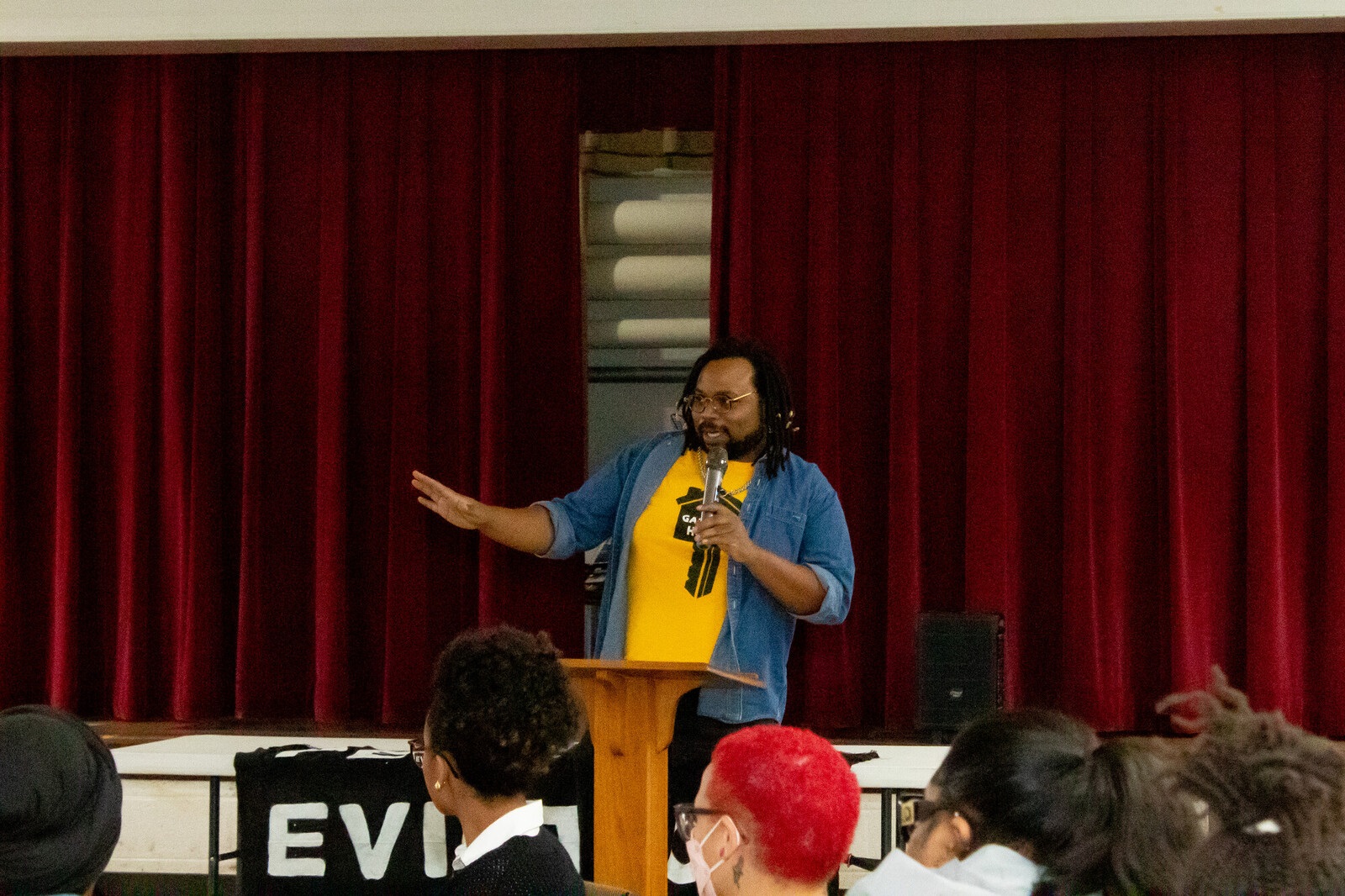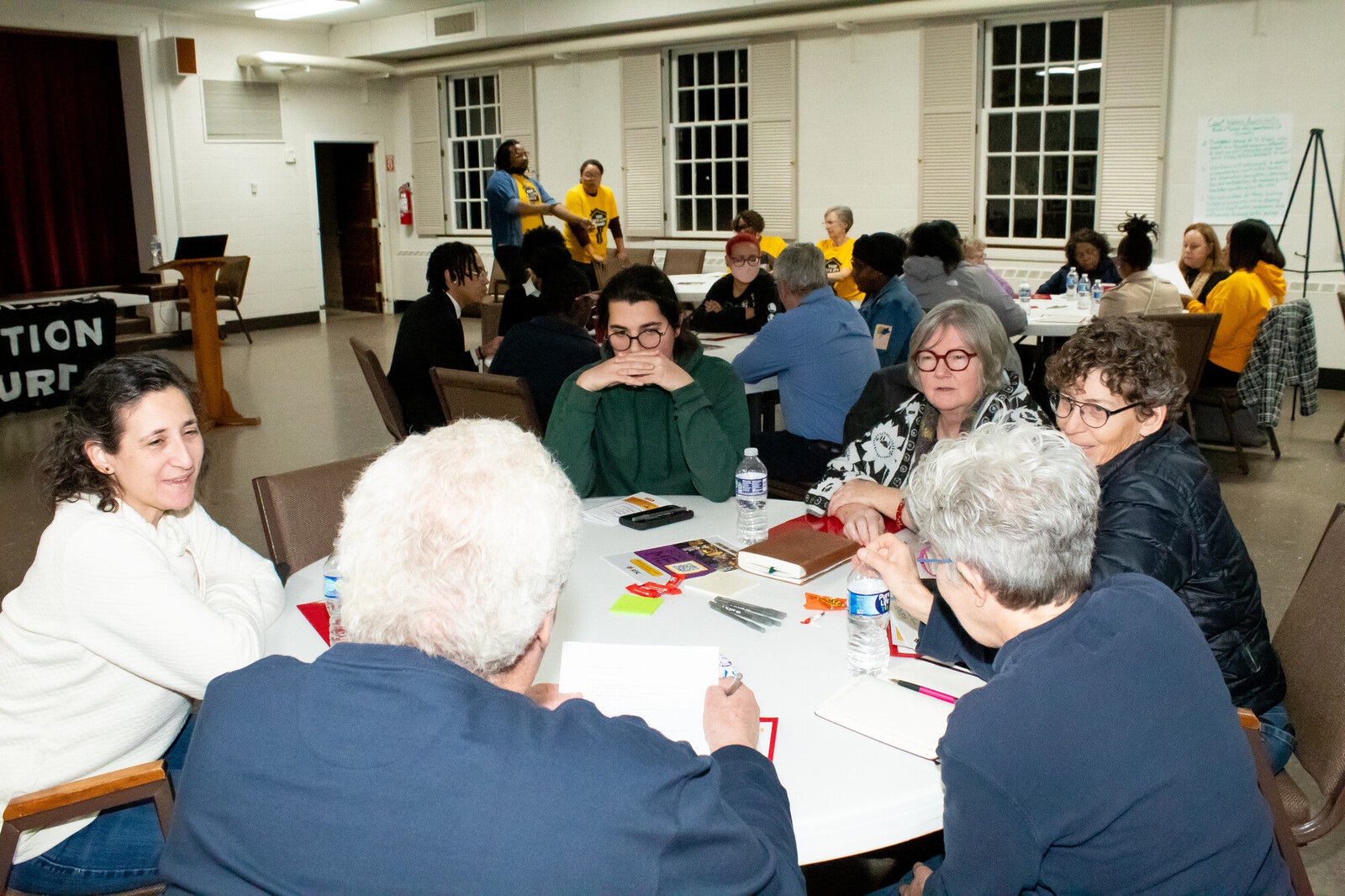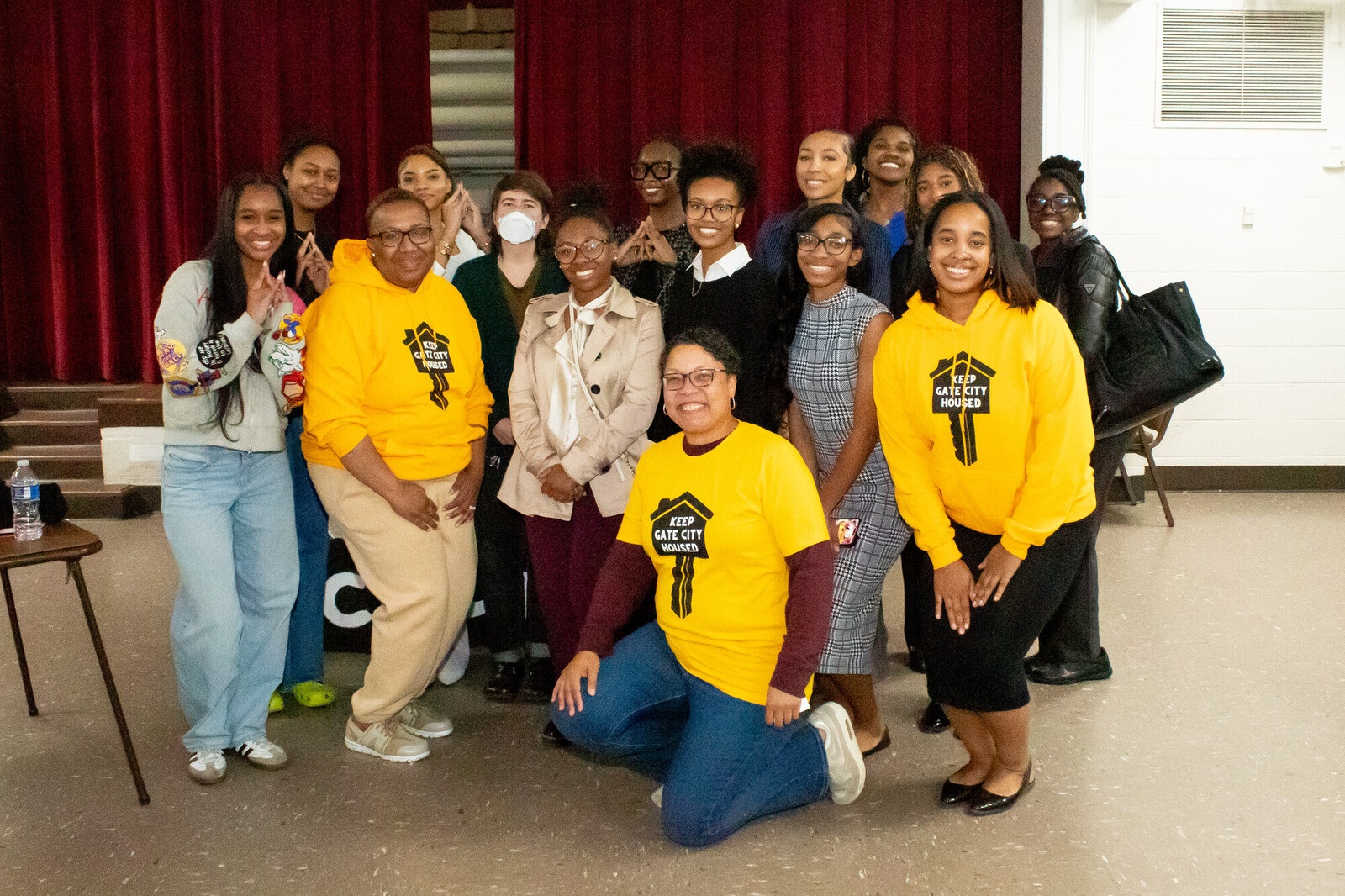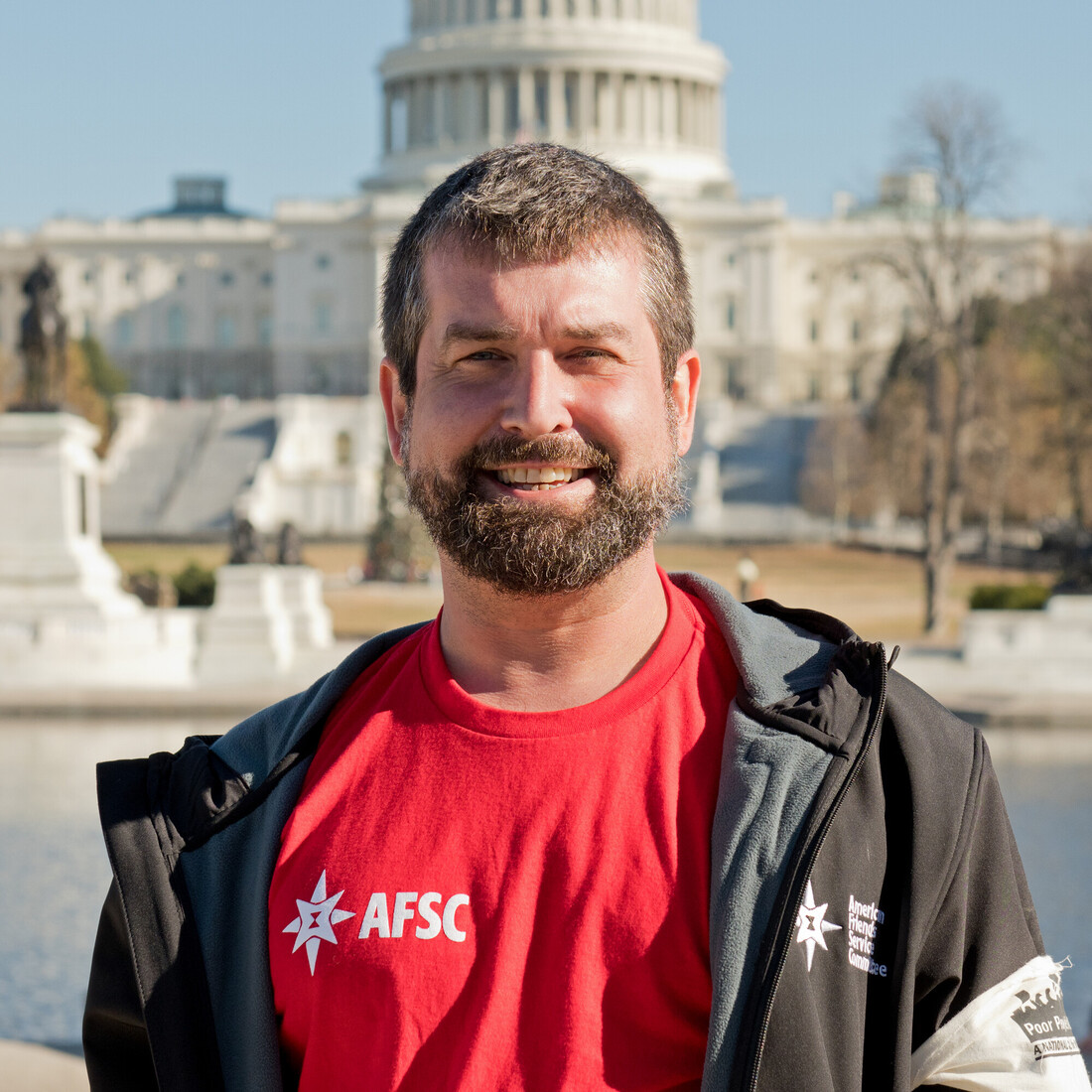
AFSC's Terrell Dungee speaks to volunteers at an eviction watch training. Photo: Tay Photography
One afternoon a few weeks ago, I joined AFSC North Carolina staff and volunteers at the Guilford County courthouse to monitor eviction proceedings. Our staff members CC Crawford and Devyn Rascoe had been there since the morning as they are several times a week. These proceedings take place twice a day, four days a week.
Unbelievably, AFSC is often the only presence besides judges, magistrates, and attorneys for local landlords to regularly witness the eviction process in civil court. That day, we watched as almost 30 families—mothers, daughters, sons, and fathers—found out whether they would get to stay in their homes. In most cases, the decision was made in less than 60 seconds.
The regular presence of AFSC staff at the courthouse is part of a monthslong effort to truly understand the scope, causes, trends, and similarities behind evictions across Guilford County. The data we collect will be instrumental in our upcoming campaign to guarantee the right to counsel for anyone facing eviction.
A system stacked against tenants
Among the 30 families up for eviction that day, not a single one had legal counsel. This imbalance in legal representation is a widespread issue in eviction courts, where landlords are far more likely to have attorneys than tenants.
Out of the 30 families we saw that day, only two or three managed to avoid eviction. But even those families only received temporary reprieves. Their fates will still be determined in future court proceedings.
It's ironic to say we lack data on the eviction problem in Guilford County when, after just a few hours, it became clear that people are living paycheck to paycheck, struggling to pay rent that is too high under unjust conditions that favor landlords.
Case after case, we heard people waiting for their next paycheck, tax return, public payment assistance, or charity aid just to catch up on their rent—only likely to fall back into debt again. The system is built to fail them.
We witnessed an African American military veteran lose his home because he was waiting for assistance from veteran services that took too long to arrive.
We watched an elderly white woman lose her home because she was forced to choose between paying for rent and utilities. She chose utilities because she needed electricity for her oxygen tank.
We saw college students lose their housing because of delays in financial aid. Now, some of those students may not be able to complete their semesters. And because evictions remain part of the public record for years, many may struggle to find housing in the future, as many landlords won’t rent to people with past evictions.
Our staff has consistently documented the direct impacts of federal policies in our communities, including recent actions taken by the Trump administration and Congress. Students at North Carolina A&T State University, for example, face housing insecurity due to delayed grant payments. Veterans’ benefits as well as Supplemental Security Income payments for low-income adults with disabilities have also been delayed. Yet the judicial system shows no sympathy for affected individuals who are then unable to pay rent through no fault of their own. And the Trump administration, which is staffed by billionaires, continues to step up its punitive action against the poor.

Volunteers at an eviction watch training. Photo: Tay Photography
Building on past success
After every eviction watch shift, our staff and volunteers discuss ways that we can provide immediate help to the individuals we’ve heard about in court and identify potential systemic solutions to the problems we are seeing.
Every year, an estimated 16,000 people face eviction in Guilford County. Many of these cases result from just a couple of hundred dollars in unpaid rent or rent that is just a few days overdue.
AFSC works closely with local organizations and community members to address North Carolina's housing crisis. Last year, we helped launch the Keep Gate City Housed campaign. Through months of community organizing and advocacy, our coalition achieved a significant victory when the Greensboro City Council approved $1.47 million in funding for rental assistance. The council also approved $440,000 for the Tenant Education Advocacy Mediation (TEAM) program, which provides renters with free legal representation, mediation services, and help applying for rental assistance.
But it is not enough. The TEAM program can serve only a fraction of those facing eviction. And funding was provided for only a year.
Our court watches have made clear that one of the most urgent needs to address the housing crisis is to provide free legal counsel for all people facing eviction. By documenting these patterns, we're building an undeniable case for policy change.
When tenants do have legal representation, studies show eviction rates can drop by up to 77%. Attorneys are crucial in helping tenants navigate complex processes, including negotiating payment plans, identifying legal defenses, and connecting tenants with emergency assistance programs.
That’s exactly what the TEAM (Tenant Education Advocacy and Mediation) project does in Guilford County. By providing legal support and mediation right inside the courtroom, TEAM helps level the playing field and gives tenants a real chance to stay housed.

AFSC staff and volunteers. Photo: Tay Photography
The path forward
Housing is a human right and fundamental to building a stable life. It provides a place to rest, recover, and call home. But every day, many people are deprived of that right.
That day I visited the Guilford County Courthouse, almost 30 families faced housing insecurity. This happens two to three times a week. By understanding the true eviction rate, the number of affected families, and common threads between landlords' tactics, we can begin to address these issues.
As we lay the groundwork for our campaign for free legal counsel for all tenants facing eviction, we are also building tenant leadership and community power across Greensboro. In recent months, we have:
- Supported tenants in two apartment complexes as they organized around unsafe conditions and neglectful landlords.
- Trained tenant leaders to speak at City Council, sharing their stories and demands for stronger protections.
- Helped volunteers who were once impacted tenants become community educators and advocates through our eviction court watch.
- Talked with hundreds of tenants about resources and invited them to take part in collective action — from signing petitions to leading their own building meetings.
Through our continued presence in the courts, we are also bearing witness to a system that needs transformation—and building evidence to make that change possible. It is one part of our longer-term vision for a social housing system where all people have a safe place to call home.
To help support our efforts, please consider making a donation today.
